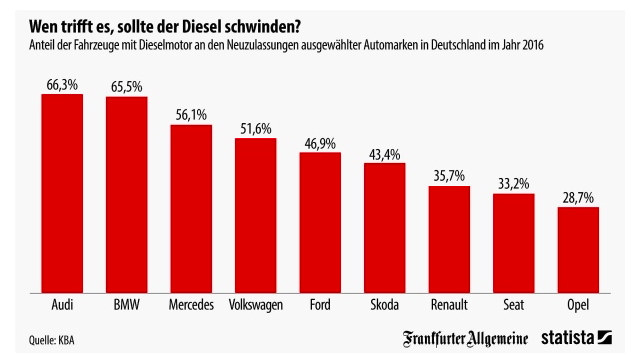
For years, Germans have acted like the planet’s savior. From championing organic food to painstakingly sorting recyclable materials, Germany is also one of the leading countries in terms of clean energy. At the same time, a third of the nation drives polluting diesel engines, and German automobile sales depend heavily on diesel.
Are Germans really at the forefront of the environmentally friendly movement?
I’ve spent much of my adulthood in Germany, as well as many summers of my teen years.
In the 1980s, we, French people were still leaving soiled toilet paper on the roadside, while Germans had the Autobahn and “Raststätte” with clean bathrooms.
When Chernobyl exploded, Germans stopped eating fresh produce, while the French were persuaded by the media that the radioactive cloud had changed the direction before passing the French-German border. Quite dumb if you ask me.
Then, in 1991, the German government passed a law that required manufacturers to recycle or dispose of all packaging material they sell. In essence, the system encourages manufacturers to cut down on packaging. As a result, the German industry set up a waste-collection system that picks up household packaging. Today, the Dot Green System operates all over Europe, inspiring even French citizens to start to sort their trash.
In fact, according to a 2017 survey by the German Environment Agency, an amazing 97% of the Germans say they feel responsible for the environment, and 70% agree they should walk or ride a bike more frequently than drive a car!
Germans don’t always follow words with actions
Does this scenario sound too good to be true? Yes, indeed.
The number of SUVs in Germany is constantly rising, most Germans don’t ride a bike more than once in a month, and organic produce only has a market share of 5% (even though 25% of Germans think buying organic produce is important).
But, nothing illustrates this disconnect between hope and reality better than the German love for cars. For more insight on this topic, I invite you to read my latest post: German Cars and American Guns.
Last January, German automaker Volkswagen announced that group sales rose in 2017 to around 10.7 million cars. In 2016, the first full year after VW’s emissions scandal, group sales had risen to a record 10.3 million cars. How could Volkswagen beat the odds and keep ahead of Toyota as the largest car company in the world? In Germany, the manufacturer’s 2017 sales dipped just slightly below the previous year. Obviously, the scandal hasn’t affected public trust significantly.
I’ll call it Germany’s “Save the Planet” paradox.
What sparked Germany’s “Save the Planet” paradox?
As of this January, one of every three cars in Germany has a diesel engine. Compared to the previous year, this marks a 1% increase. Even though the regular engines sales grew more (up by 1.6%) noticeably, public trust in diesel cars doesn’t seem endangered. Of course, Volkswagen diesel sales slightly decreased, but other carmakers easily made up the difference.
But, why is diesel so bad?
Diesel exhaust is bad for human health because of its nitrogen oxide emissions: These ultra-fine particles are small enough to penetrate the lungs, and affect the respiratory tract. On a personal note, when Jasmine (my now 18-year old daughter) was a child, she suffered greatly during the German winters. According to our pediatrician, the best medicine was to send her out of the city to the sea or countryside!
Two weeks ago, a German federal court ruled that millions of diesel cars may soon be banned from city centers. For the German weekly Der SPIEGEL, “the verdict exposed the failing of German policymakers . . . and their cozy relationship with the automobile industry.” (For more information, check out the article here)
Basically, the paradox really boils down to a conflict over money.
The automobile industry is one of the most important parts of the German economy, comprising 4.5% of the national output. With four-fifths of all cars exported, workers in this industry represent 2% of the whole German labor force. “‘Made in Germany’ has become a guarantee of engineering prowess that has helped to promote the country’s exports of industrial equipment and a myriad of niche products from the Mittelstand of medium-sized firms,” stated The Economist two weeks ago.
Yes, German carmakers depend heavily on diesel, as the graphic below highlights. (It shows the share of Diesel engines in new sales in 2016).

Based on these figures, it’s not surprising that some writers at The Economist doubt the ability of German engineers to move from mechanical to electronic engineering. Consider, for example, the fact that the German automobile industry lags behind electrical car development.
Germans love their cars above all. Diesel cars are still very popular, also because the fuel is cheaper than regular gasoline. Of course, it’s not really compatible with the nation’s moral fervor to save the planet. But, at least this discrepancy makes them seem more human.
Side note:
Diesel cars accounted for under 3% of all new car sales in North America just prior to Volkswagen Group’s emissions scandal. After the scandal, Volkswagen Group no longer offers any diesel cars for sale in America.





Interesting article, Catherine. Thank you.
Thank you Evelyne (live from Florida)